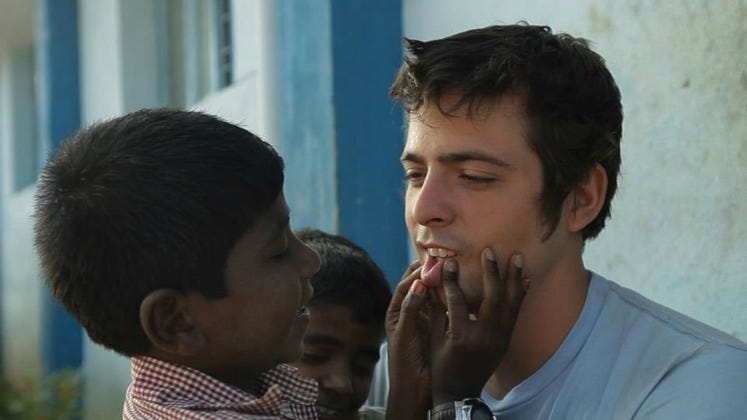Blood Brother

“Blood Brother” is less a straight documentary film than a diary portrait of director Steve Hoover’s best friend, Rocky Braat — a troubled, directionless young man who freely admits he didn’t seem to have much purpose in life. He barely made it out of school, and a family background of physical abuse and drug use left him inadequately prepared for adult life.
But on a chance trip to India, Rocky encountered a facility for young children with AIDS. He stayed to volunteer and kept staying until his visa ran out. When we first encounter Rocky, he is returning to Pittsburgh to visit Steve. But he’s a lump, barely able to express himself, who can’t do anything but wait to get back to “my kids.”
Eventually, Hoover returns with Rocky and sees firsthand the amazing work his friend is doing, as well as the change that has come over him by living selflessly for others. The children are gorgeous and joyful, swarming the Americans with their hugs and chatter. Largely shunned by the local village people, the kids glom onto any sort of parent figure they can find.
Later, the film probes even deeper, and we find out about how, inexplicably to Western sensibilities, Rocky is disdained by the locals as a foreign interloper. In one heartrending sequence, Rocky becomes seriously ill and we learn that some of the villagers are openly expressing their hope that he has acquired HIV through his close contact with the kids.
We also learn about his shy, erstwhile courting of a young Indian woman. There’s a certain mercenary aspect to the coupling; he’s mostly doing it so he can attain permanent residency in India. But there’s a layer of respect and affection there, too. If they aren’t passionately in romantic love right now, we suspect they will come to be as the years roll on.
The hardest section to watch, and the most illuminating, is when a scrappy little boy named Surya grows seriously ill. The doctors give him little chance of survival, and he’s left in a hellish Indian rural hospital that is basically little more than death’s waiting room.
Hoover uses the unblinking eye of the lens to map the child’s symptoms — weeping sores, near-comatose state and lips that are, as Rocky puts it, simply falling off. But Rocky stays by Surya's side day after day, night after night, giving the boy unceasing care and affection. When he uses a Q-tip to wipe away the horrid crust built up around Surya’s eyes, and we see one tiny pupil gazing out at us, it seems like a monumental human victory.
“Blood Brother” isn’t a perfect movie. I wished Hoover had concentrated a little more on his own relationship with Rocky and show how he changed from their childhood to manhood. This is an occasion where a filmmaker should have been more selfish and turned the camera on himself a little bit.
4 Yaps



